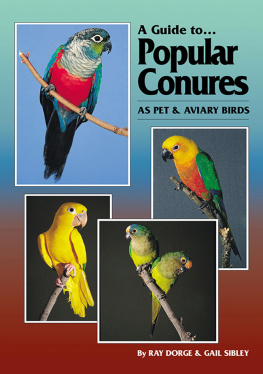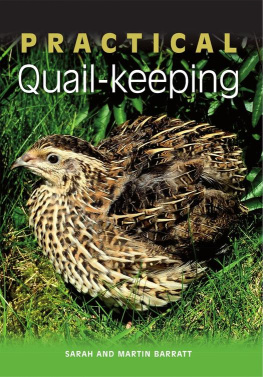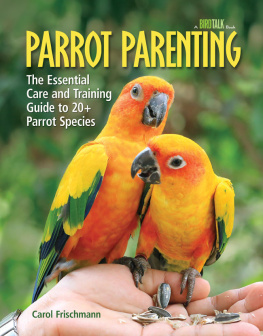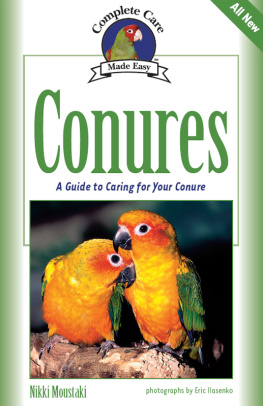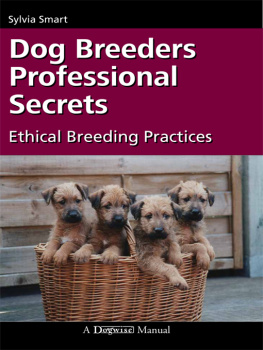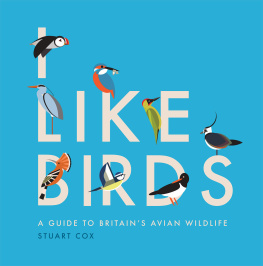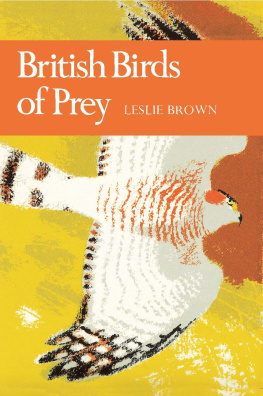
A Guide to
Popular
Conures
AS PET AND AVIARY BIRDS
It is not only fine feathers that make fine birds. Aesop
By Ray Dorge & Gail Sibley
Published and Edited by ABK Publications
2001 ABK Publications
All rights reserved. No part of this publication may be reproduced, stored in any retrieval system, or transmitted in any form or by any means without the prior permission in writing of the publisher.
First Published 2001 by
ABK Publications
PO Box 2330 Burleigh BC
Queensland 4220
Australia
www.birdkeeper.com.au
ISBN 978-0-9587102-7-5
Front Cover:
Top left: Crimson-bellied Conure.
Centre right: Janday Conure.
Bottom left: Queen of Bavarias Conure.
Bottom right: Pair of Golden-crowned Conures.
Back Cover: Nanday Conure.
(All cover photographs by Peter Odekerken)
All other photographs by Gail Sibley
except where shown.
WORDS OF ENCOURAGEMENT AND CAUTION
The study of conures in aviculture is in its infancy. Little has been recorded for posterity. Therefore, we encourage you to record your observations and to share them with others. Join bird societies, attend parrot conventions, symposiums and exhibitions. Become an active member of local parrot clubs. Become involved. Your input is needed.
A word of caution for potential breeders of conures. From the very start, avoid becoming overcommitted. Ensure that you have a viable, dependable outlet for your chicks before you initiate a breeding program. Without an outlet, the more prolific conure species will overrun you with chicks that will turn into adults having their own chicks a self-perpetuating problem. Overcommitment can lead to disenchantment and possibly to loss of interest altogether.
For the conure fanatic who has already mastered the pitfalls of bird keeping, we challenge you to qualify your aviary for the Model Aviculture Program MAP. Certification in an avian training course would also be an admirable personal goal.
The Certified Avian Specialist (CAS) program, sponsored by the Pet Industry Joint Advisory Council (USA), consists of two parts each followed by an examination. Upon successful completion, a CAS certificate is awarded. The first section of the program consists of a four hour lecture/seminar. A home workbook/reference section follows. The program is designed to increase the knowledge and expertise of pet industry personnel who handle companion animals.
The Model Aviculture Program (MAP), established in 1990, was designed by American aviculturists and avian veterinarians to improve avicultural practices by the setting of basic standards for avian husbandry. A veterinarian completes the inspection following MAP guidelines.
ABOUT THE AUTHORS
Ray Dorge and Gail Sibley have been keeping and breeding parrots (far too many according to their friends and relatives) for over 15 years. They have also had the privilege of being keepers for an aviary/sanctuary, coowned and supervised by an avian veterinarian, that housed macaws, cockatoos, Amazon, African Grey and Hawk-headed Parrots and conures.

The authors, Ray Dorge and Gail Sibley.
Ray Dorge is an author, columnist and freelance writer. Rays column, Squawks n Chatter , which appears in Australian Birdkeeper magazine and the column, News and Views Stateside appearing in Parrots magazine keep him on his avicultural toes. His aviculture and wildlife conservation articles appear regularly in Australia, the UK, Germany and the USA. Born and raised in Canada, he obtained his Bachelors Degree (Anthropology focus) from Queens University in Kingston, Canada.
Gail Sibley is a pastel and watercolour artist, as well as a freelance photographer. Her artwork is found in private and public collections worldwide. Born and raised in Kingston, Jamaica she completed her A-levels in England. She then went on to obtain a Bachelors Degree in Fine Arts (Honours) from the University of Manitoba, Canada and a Masters Degree in Art History from the renowned Queens University in Kingston, Canada. Gails photography accompanies Rays articles and appears in A Guide to Pet & Companion Birds , their first book together.
ACKNOWLEDGEMENTS
Take note! If you should choose to skip this section you will miss the introductions to those busy avicultural professionals who so unselfishly contributed their insider secrets and qualified opinions.
Rolling the Credits
There is a tremendous need for information on conures as pets, explained Janet Casagrande, of Rain Coast Aviary, Vancouver Island, Canada. Janet and Brian Casagrande thus seeded the idea for this book.
We then approached our Publisher, Nigel Steele-Boyce, with the proposal for this book. He gave us his approval and provided a list of popular conures currently available in Australia. We thank him for always being receptive to our ideas, for his confidence in us, and it goes without saying, for his patience and understanding during the writing process.
The Casagrandes breed a wide range of conures including some very rare species for which they are applying for First Breeding Awards in Canada. They generously loaned us many of their reference books on conures. This collection was the springboard for our research.
We are honoured that a renowned and highly respected aviculturist and author, Rosemary Low, allowed us to quote her descriptions of each of the species. Thank you very much Rosemary.
Sandra (Sandi) Brennan of Fine Feathered Flock Aviary who is the current President of the International Conure Association located in New Mexico, USA, was enthusiastic about our book. Not only did she offer her breeding experiences but also introduced us to other conure devotees. Sandi is no stranger to the ways of the conure. Bird keeping began at age six with two finches but did not take full flight until much later, when she was just married. Sandi and Martin Brennan caught what they call the fever, while on honeymoon at Parrot Jungle in Florida, USA. They soon found themselves in the possession of over 200 birds ranging from finches to macaws. Since 1989, Martin has focussed on macaws, and Sandi on conures. The Brennans have over 30 conure species of which they have bred all but ten.
For an insight into a neighbourhood conure aviary, we visited Bob and Wendy Wilson who own Saxe Point Aviary in Victoria, Canada. Outdoor flights overlook their backyard gardens and indoor flights occupy the greater part of their walk-out basement. It comes as no surprise that pet parrots have colonised almost every room of their home. They have owned birds for 11 years. Currently, Saxe Point Aviary houses the Sun Conure Aratinga solstitialis , the Nanday Conure Nandayus nenday and the Maroon-bellied Conure Pyrrhura frontalis . Bob and Wendys aviary motto is Healthy, happy adult birds breed happy, healthy babies.
For a look at the business of conure breeding, we visited Judi Robben at Free Flyte Aviary in Kansas, USA. Judi, a registered nurse and paramedic, is also a certified avian specialist graduate and has qualified her aviary for MAP certification. I did both certifications as goals to improve my knowledge base and become more professional in my business. She has vast experience with a variety of conures as they are her greatest love, the Painted Conure Pyrrhura picta picta being her favourite. Judi is a Founding Member of the Pyrrhura Breeders Association.
She introduced us to another Founding Member, Don Harris, who is currently serving as President of the Pyrrhura Breeders Association, for his impressions on his Fiery-shouldered Conures Pyrrhura egregia .

